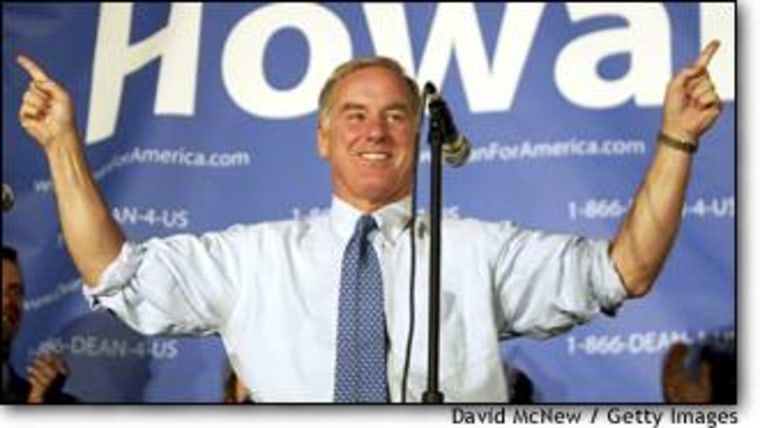In the surreal mind-set of the campaign expectations game, psychology can get twisted at the end of every quarter. Democratic front-runner Howard Dean’s campaign publicly set $15 million as its goal for fund raising for the third quarter, which ended at midnight Tuesday. According to Dean’s Web site he raised $14.8 million, with last-minute contributions still being counted.
Dean had dramatically exceeded fund-raising expectations in the second quarter by collecting $7.6 million. Is his $14.7 million a wee bit of a deflating result for the third quarter? Only if you live on the plane of surreal expectations.
EXTRAORDINARY MONEY MACHINE
Dean’s extraordinary money machine is still far more efficient than anything Missouri Rep. Dick Gephardt, Massachusetts Sen. John Kerry, or the other Democratic contenders have working for them.
Dean is on course to have enough money to air television ads and hire operatives in states where fund-raising laggards may not be able to during the hustle-bustle of primaries that will take place in February and the first week of March.
Moreover, Dean could raise enough money that he could choose to opt out of the taxpayer matching fund system, which imposes limits on how much money candidates can spend during the primary season.
In an interview Wednesday on CNBC’s “Capital Report,” Dean campaign manager Joe Trippi said he and Dean had not yet decided whether to go outside the spending limit.
“We do believe it is an important decision that we’re going to have to make, because in the end Bush is just raising this money.... They’re going to raise $200 million and spend it against the Democrats between April and August when we go to the convention.... If we make the decision, it would be to compete with Bush. We’ve already proven that we can compete with the other Democrats.”
Simon Rosenberg, who heads the centrist New Democrat Network, put the Dean bounty in perspective by noting that in a 10-candidate field the former Vermont governor was able to raise 50 percent more than Bill Clinton raised in the best quarter of his 1996 re-election effort. Rosenberg called Dean’s feat “almost miraculous” and added, “We have to recognize that the Dean campaign is the best-run campaign we’ve ever seen.”
Taking the party-wide view, Rosenberg pointed to what almost no one else has noticed: Based on the preliminary estimates for the third quarter, the 10-person Democratic field collectively will have outraised the Bush campaign, an indication of how fired up Democratic donors are.
“If Bush is this supposed fund-raising king, then this so-called ‘weak’ Democratic field — to use Karl Rove’s word — is outraising him,” Rosenberg said.
KERRY IN SAME TIER
In the first primary state of New Hampshire, Dean’s nearest rival, as measured by opinion polls, is Kerry, who appears to have raised only about a third as much as Dean did during the July-through-September period.
But the Kerry camp was taking the long view Wednesday, pointing out that he has raised more than $20 million in total receipts since the campaign began (that includes the $2.6 million Kerry transferred to his presidential effort from his Senate re-election fund).
“That puts us in a tier only Dean occupies,” Kerry campaign spokesman Robert Gibbs told MSNBC.com. And Gibbs pointed out the hazard of looking only at quarterly numbers. “If you look simply at quarterly numbers, Dean would have dropped out at the end of March.” In the first quarter of the year, Dean raised $2.9 million.
For the entire campaign to date, Dean has raised about $25 million.
New Hampshire pollster Rich Killion said the Kerry campaign’s $20 million total “is an impressive number, and they should be pleased with that. What challenges them is the bold-face impressiveness of the large amount of money Dean raised in this past quarter, as well as their campaign fallen victim to being outraised by Dean for the second consecutive quarter.”
Killion added that Kerry operatives are “sagely trying to frame the race — on all fronts — as Kerry vs. Dean. That’s very important at a time when Wesley Clark’s entry has generated significant media attention and notable movement in early polls.”
Clark’s campaign has not yet announced how much it raised in the third quarter; the retired general became an officially declared candidate only two weeks ago.
CLARK’S PROSPECTS
“Clark could easily raise $10 to $15 million in a quarter from a standing start,” said Rosenberg.
In New Hampshire, Killion said, Clark is off to “a very good start” with his first tour of the state as an official declared candidate last weekend.
“He generated a good buzz,” Killion said. “His town hall forum at New England College was put together on short notice, drew a large crowd and was broadcast live on C-SPAN. His treks through Manchester and the Seacoast also generated impressive media coverage. It will be interesting to see how he quickly moves to build on this.”
For its part, the Gephardt campaign portrayed Dean’s nearly $15 million third-quarter take as impressive, but not decisive. “In Iowa there is a limited supply of how much media you can buy,” said Steve Elmendorf, Gephardt’s campaign chief of staff.
If Dean decides to forgo the matching funds and spends freely outside the spending caps, it would not give him the edge in short run, Elmendorf said, but it might help him in expensive states later in the calendar, such as in New York and California, places with huge electorates and premium-priced media markets.
The Gephardt campaign has said it would need $20 million by year’s end to wage an effective campaign. The campaign did not release an estimate of its third-quarter receipts on Wednesday. Gephardt collected nearly $4 million in the second quarter.
Gephardt strategists are counting on voters’ perceptions being shaped by the first two contests in Iowa and New Hampshire. What will really matter, they say, is who emerges from the pack as the one contender to take on Dean.
